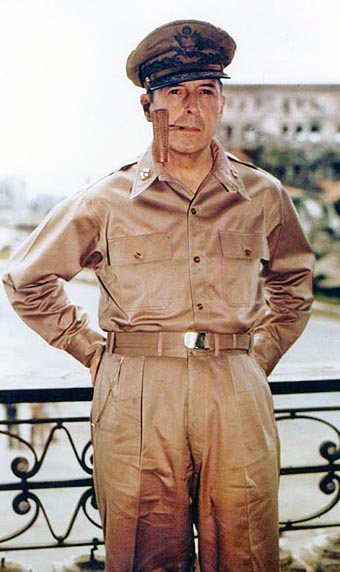Douglas MacArthur
Douglas MacArthur served in the Far East in World War Two. He famously said ‘I shall return’ when America withdrew from the Philippines in 1942. This promise was eventually kept.
Born in 1880, Douglas MacArthur studied at West Point Military Academy and managed to gain a commission in 1903 for the engineers. MacArthur set off to work in Tokyo two years later; his father worked there as America’s official observer of Japan’s military operations against Russia.
Once America entered World War One in 1917, MacArthur saw action in France. MacArthur fought successfully at the Battle of the Marne and by the end of the war he was the field’s youngest divisional commander.
After the World War Two attack on Pearl Harbour, MacArthur was in charge of the Philippines. He was tasked with defending the islands from Japan. In the face of a Japanese military machine which was formidable (as Britain discovered at Singapore), MacArthur failed to accomplish this objective. American forces withdrew from the Philippines in 1942. MacArthur left fixed on retrieving the islands.

America was in a better position by 1943 to attack Japan. To do this, MacArthur formulated an ‘island-hopping’ strategy. Instead of taking every single island, the Americans captured the larger and more highly regarded islands in the Pacific occupied by the Japanese (Iwo Jima and Okinawa). They left the lesser ones to, in MacArthur’s words, "wither on the vine".
However America still had a high amount of casualties and an attack on mainland Japan could be catastrophic for America: American intelligence predicted that one million soldiers would be killed or injured if America tried to actually take Japan. President Truman therefore commanded using the atomic bomb on Hiroshima and Nagasaki in August 1945.
Douglas MacArthur worked in Japan before World War One and had a very thorough awareness of Japan and its culture. Since MacArthur was Supreme Commander of Allied Forces in the Pacific, he became head of the Japan occupation forces after they surrendered in August 1945 where he stayed until 1951.
MacArthur persuaded Emperor Hirohito to make a radio announcement that he was only a mortal, not God. He also ensured that the emperor was not sentenced to trial for war crimes. He was concerned that this would provoke a public backlash in Japan and increase hostility between occupied and occupiers. Only government or military figures like Tojo were put on public trial.
MacArthur helped rebuild a nation seriously affected by the war. A democratic constitution was given to Japan which MacArthur surveyed and internal reforms were launched. The irony was that more resentment was shown to MacArthur in Washington DC than in Japan - several American politicians resented MacArthur’s acquired power.
After his time in Japan, Douglas MacArthur became head of the United Nations force which opposed the North Koreans in the Korean War. MacArthur again displayed his military nous with an ambitious amphibious landing at Inchon. This was risky and defied standard military logic; its success further enhanced MacArthur's military reputation.
The Communist Chinese government made threats of intervention if the UN troops went ahead of the 38th Parallel. MacArthur was ordered by President Truman to push to the Yalu River, but did not give MacArthur’s desired order: to ruin the bridges crossing the Yalu River. This move would have been tricky for China to cross the river on masse. The bridges remained unharmed and vast numbers of Chinese soldiers stormed into the Korean peninsula. MacArthur protested that no order had been made. He was freed from his command but went back to America with the label of a hero.
MacArthur’s desires of a political career did not amount to anything. He died aged 84 in 1964.
See also: Erich von Manstein
MLA Citation/Reference
"Douglas MacArthur". HistoryLearning.com. 2026. Web.
